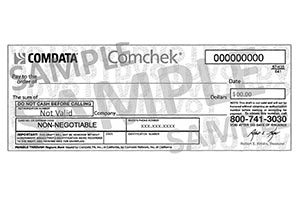Paper Checks Still Common in Trucking; Move Underway to Migrate to E-Payments

This story appears in the May 1 print edition of Transport Topics.
Many trucking and third-party logistics companies still write checks to pay their invoices, but efforts are underway to transition from pen and paper to point-and-click e-payments. If successful, it would shift decades-old business patterns ingrained in the industry.
A Comdata survey found that 55% of fleets with fewer than 10 trucks said paper checks still were the most common payment method. It was the same percentage in the 11-to-49 truck category and only dropped to 54% in the 50-to-149 segment.
The payment processor in late April introduced Comchek Mobile, an alternative to the standard paper checks, allowing users to pay drivers, fuel advances and lumper fees via a mobile app.
“It’s sent in a peer-to-peer way, similar to a PayPal or Venmo. You can use the money to buy fuel, take money out of an ATM or forward it into your bank account,” said Terrence McCrossan, a senior vice president with Comdata’s North American Trucking division.
Wex, another major payment processor, doesn’t have immediate plans to offer a similar product but instead is focusing on the power of analytics and how the smartphone can help to gather more data.
“A cellphone provides a way to interact with a driver and collect information about routes, job type, even the perceived quality of the merchant’s restrooms. This information can be used to understand driver behavior and, hopefully, impact wasteful spending,” said Kurt Thearling, vice president of analytics at Wex.
He added the ultimate goal is to predict fuel card misuse from simple things such as purchasing the wrong grade of fuel to fraud and fuel theft.
Sue Schoenthaler, logistics and operations manager at Evans Delivery Co., said that she pays freight factors online, saving her up to 75 paper checks that she previously issued every week. Factors buy invoices from trucking companies, often smaller fleets, then assume the responsibility of collecting on those bills.
Schoenthaler told Transport Topics before shifting to online payments, one of her employees spent 20 hours per week on paperwork.
“She issues a paper Comchek and then enters a memo into our system. [Previously] about 50% of her time was just issuing the paper checks, so this is a real time saver,” she said. “It’s also significantly reduced the amount of time it takes to distribute funds to drivers.”
The Evans Network of Cos. — the parent of Evans Delivery — ranks No. 59 on the Transport Topics Top 100 list of the largest U.S. and Canadian for-hire carriers.
Becker Logistics CEO Jim Becker told TT that only 30% of his transactions are digital, although he pushes for electronic fund transfers. He said it’s frustrating but also understandable because 60% of his 4,000-carrier network has 25 or fewer trucks.
“You’re working with Bob, who has a few trucks, and Martha is processing all the paperwork and she’s still mailing in her husband’s bills of lading and typing out invoices. If I told her that I wanted to do everything electronically, I think I’d freak Martha out,” Becker said.
Steve Clark, vice president of freight operations at Dunavant Logistics, agreed that paper invoices and checks remain the predominant standard and it’ll take time before e-payments render the old methods obsolete.
“It’s what’s been done for 20-plus years and, in many cases, no one has asked to change. So if we wrote them a check last week, we’ll write them a check this week,” Clark said.
Other third-party logistics firms have been more aggressive in the transition to electronic fund transfers.
Choptank Transport pays 92% of carriers online and receives e-payments from 78% of customers, according to President Geoff Turner. He told TT that his company uses automated clearinghouse (ACH) payments using traditional banks, not through Comdata. The 3PL ranks No. 31 on the TT sector list of the top freight brokerage firms in North America.
“It has been a major push for us over the last two years,” Turner said. “We have quite a few customers who don’t require any paperwork from us. We’ll electronically receive the bill of lading from the carrier and it gets saved into the invoice, so we never physically touch it. It’s a big cost savings for us.”

